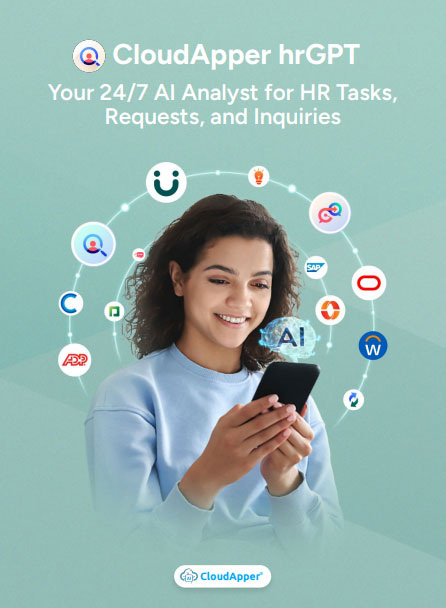AI is transforming HR by automating repetitive tasks, reducing errors, and improving employee satisfaction. CloudApper seamlessly integrates with existing systems like UKG and Workday, enabling HR teams to focus on strategic goals.
In my experience working with HR teams, one thing is clear—managing day-to-day operations in HR is no easy task. From onboarding new hires to tracking time off, HR teams are often bogged down by administrative tasks that consume far too much time. But there’s a way to lighten the load and improve efficiency, and that’s where AI comes in. Specifically, AI can automate many of the repetitive processes that HR teams deal with daily, allowing them to focus on what matters most: people.
Let’s consider a scenario. Imagine your HR team spends hours each week manually tracking employee hours, handling payroll discrepancies, and responding to basic employee questions. Now, imagine that all those tasks could be automated. That’s the potential of AI in HR. According to a 2021 study by PwC, 73% of future HR leaders said they believe AI will be a key enabler for their organizations over the next five years. It’s not just about efficiency; it’s about transforming how HR operates.
Take, for example, onboarding. It’s a critical process that often involves a lot of paperwork, scheduling, and communication. With AI, much of that can be automated. An AI Recruiter can schedule onboarding sessions, generate multiple offer letters, send out necessary documentation, and even track the progress of new employees as they complete various steps. It ensures consistency and frees up HR staff to focus on integrating new hires into the company culture, which is arguably the most important part of onboarding.
In my work, I’ve seen HR teams benefit greatly from AI automation when it comes to time tracking and attendance management. Manually tracking employee hours, especially in large organizations, is not only time-consuming but also prone to errors. And errors in payroll are a surefire way to cause employee dissatisfaction. Custom AI solutions, like those offered by CloudApper, integrate seamlessly with major Human Capital Management (HCM) platforms such as Kronos/UKG, Workday, and ADP, automating time tracking and ensuring accurate data flows directly into payroll systems. This eliminates manual calculations and significantly reduces the risk of mistakes.
I’ve worked with companies where employee queries often flood HR departments. Employees want to know how much paid time off they have left or inquire about benefits, and HR spends hours responding to the same questions over and over. AI-powered chatbots can step in here. By handling routine questions 24/7, chatbots give employees the answers they need instantly, without involving HR staff. And it’s not just about time saved—research shows that 75% of employees prefer using chatbots for quick HR-related inquiries. It’s an easy win for both HR teams and employees.
Another area where AI shines is compliance. Keeping up with changing labor laws and ensuring compliance with regulations can be overwhelming. This is where AI becomes invaluable. With platforms like CloudApper, AI can automatically track and report on compliance requirements, giving HR peace of mind that they’re always meeting legal standards. And the best part? It works seamlessly with the tools HR teams are already using.
One of the most compelling reasons to adopt AI is its ability to scale with a company’s growth. For instance, as a company expands, so does its workforce—and with it, the complexity of managing HR processes. AI can handle that growth effortlessly, ensuring that as the organization scales, HR operations remain smooth and efficient.
CloudApper, in particular, stands out because it doesn’t require a complete overhaul of existing systems. It integrates easily with platforms like UKG/Kronos, Workday, Ceridian Dayforce, and others, allowing businesses to adopt AI-driven solutions without disrupting their current processes. This flexibility is key. Many companies hesitate to adopt AI because they fear the complications of implementing new systems. But with CloudApper, the transition is seamless.
In today’s competitive labor market, HR needs to focus on strategic goals like employee development and retention, rather than being bogged down by administrative tasks. AI allows HR teams to do just that. By automating repetitive processes, reducing errors, and improving the overall employee experience, AI is helping HR move beyond paperwork and focus on what truly matters—people.
If you’re looking to streamline HR processes, reduce workloads, and improve employee satisfaction, AI is no longer a future consideration; it’s a necessity. And platforms like CloudApper make it easier than ever to make that leap.
What is CloudApper AI Platform?
CloudApper AI is an advanced platform that enables organizations to integrate AI into their existing enterprise systems effortlessly, without the need for technical expertise, costly development, or upgrading the underlying infrastructure. By transforming legacy systems into AI-capable solutions, CloudApper allows companies to harness the power of Generative AI quickly and efficiently. This approach has been successfully implemented with leading systems like UKG, Workday, Oracle, Paradox, Amazon AWS Bedrock and can be applied across various industries, helping businesses enhance productivity, automate processes, and gain deeper insights without the usual complexities. With CloudApper AI, you can start experiencing the transformative benefits of AI today. Learn More

CloudApper AI Solutions for HR



- Works with








- and more.
Similar Posts

Best Practices for AI in Workforce Management: What Every HR…

Why HR Process Automation is the Future of Workforce Management






